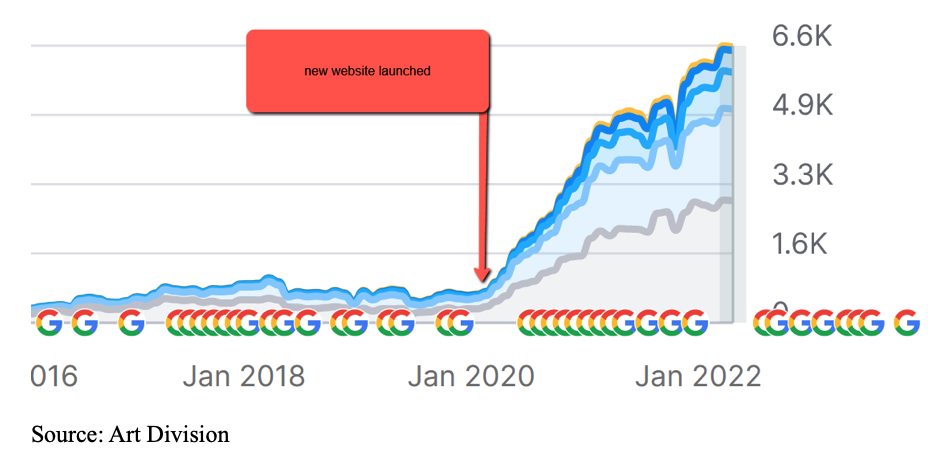From year to year, the property market either goes up or down and this results in either an increase in instructions and transactions or a slowdown and a reduction in revenue for estate agents in the UK.
The housing market at present is slowing and property prices are falling from their peak levels, with more significant drops expected this year. This results in fewer instructions for estate agents and also fewer completions, which in turn means less revenue.
While both seasons are inevitable, and most experienced agents know how the trends work, many are currently stopping their marketing efforts to save money in the short term.
Although there are some marketing campaigns that can and perhaps should be paused in a slow market, there are others that absolutely, no matter what, should not be stopped. In fact, a slow market presents a great opportunity for the savvy estate agents who can gain a massive advantage and significantly increase their instructions when the market picks up again.
Below I go through what campaigns you can pause and which ones you should keep or invest more into.
1. Which marketing campaigns should I pause during a slow market?
During a slow market, there are fewer sellers coming onto the market and fewer buyers looking to buy. With the rise of mortgage rates, first-time buyers are finding it harder to get on the property ladder and instead are forced to rent, while second-time buyers and upsizers may choose to stay put for a little longer.
On the other hand, a slow market could present a great opportunity for investors to buy a new property at a lower price so perhaps there may be an increase in landlords entering the market and in need of new tenants, while equally there is a higher demand for rental properties and a big increase in rents achieved.
How the market impacts the buying and selling decisions is also relevant to the locations you cover. London is always a bit different to the rest of the country.
SO, knowing all this, any campaign aimed to attract sellers that are relying on ‘good timing’ and immediate conversions – such as leaflet drops or Google AdWords (paid campaigns with Google), can be potentially scaled down or paused. Those campaigns rely on engaging with the sellers at the right time and expect a direct conversion into a valuation request. During a slow market, we know that perhaps the time now is not right for most, and those campaigns can be quite costly, so pausing or reducing them will give you short-term savings while you will not lose a big market share.
Ideally, however, you should consider changing your messages and intent behind those campaigns instead of stopping them altogether.
2. Which marketing campaigns should I NEVER stop during a slow market?
Estate agents must have a long-term view when structuring their marketing campaigns and spending. Those considering selling may be on the fence at present, but as soon as the market picks up, they will move forward with their plans.
A great example is the Covid lockdown. The market was put on pause, and there were no transactions for a few months. Once the lockdown was lifted, many agents had their busiest and best year in their existence. But the real winners were those agents who did not stop all their marketing activity during the lockdown – instead, they invested in their marketing assets and overtook the agents who preferred to save in the short run.
Here is an example of a client of ours that did exactly that - as a result, the growth in their instructions, revenue and profits for the months after the lockdown was exponential.

So, which are those campaigns that present an opportunity for agents at present?
They include SEO, content marketing, email marketing and social media.
- SEO – You absolutely must NOT (ever) stop your SEO activity during a slow down or a peak season – SEO must be done all year round consistently, but especially in a slow market.
Many agents will stop their SEO work, focusing on the short terms savings.
This, in turn, presents a great opportunity for the savvy agents to steal the spotlight.
Organic ranking for phrases such as ‘estate agents in YOUR Location’ are the hardest to achieve, especially in very competitive areas. SEO is also a slow, long-term game.
If you stop this work and lose your rankings, once the market picks up, it will take you a long time to regain any good positions, losing you a massive chunk of potential revenue.
In other words, the short-term saving from stopping SEO will be far smaller than the long term gains you will lose.
So, if your current website is not planned with SEO in mind, now is a good time to update it and properly optimise it.
- Content Marketing – as they say, content is king. During a slow period, you must continue to engage with your audience, reassuring them of the long-term prospects and building trust with your potential clients. Building trust in your brand will help you increase your instructions when the sellers are ready to put their properties on the market again.
- Email marketing – although this is, in a way, part of the content marketing family, it’s important to pay separate attention to your email lists and engagement. Growing your email list should be your No 1 priority during a slow period, as you can pick up many more subscribers for a lot less. This presents a big pool of opportunity when the market picks up. If you are not running any email nurturing campaigns at present, now is a great time to invest in creating well-planned email marketing sequences and reap the benefits later.
- Social media marketing – although the property market has much lower engagement than other sectors, you can maximise the ROI from your content marketing by continuing to engage with your prospects on your social channels. You can look to scale down your spend, but you should not stop this altogether.
Ultimately, if business is slowing down, you can take the time to prepare for the busier seasons. Take this time to discover new ways to attract prospects since you should have more time to research your audience and competitors. You could use your findings to inform future campaigns.
Consistency in Marketing Is Key
Ultimately, don't pause advertising, regardless of business pace. Engage with your audience, produce valuable content, and stay top-of-mind with customers.
Estate Agents operate in a very competitive market and should market throughout the year. While halting campaigns may seem cost-effective, marketing is an ongoing effort.
Consistent marketing of your brand and offerings can build trust and strengthen connections with your audience, resulting in a more secure bottom line and consistent results.
By maintaining various strategies throughout the year, your brand will stay in the minds of customers, leading to increased sales during slow business periods and a potentially higher ROI compared to stopping marketing efforts.
Furthermore, it will lead to an even higher ROI once the market picks up, making you far more revenue and profit than any savings you may have had.
Need help with the planning of your digital marketing for your estate or letting agency? Feel free to reach out and book a free agency consultation: www.artdivision.co.uk






